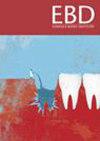Lithium disilicate, full coverage crowns: what is the effect of using conventional impressions compared to digital impression with respect to the internal fit of the restoration? A systematic review
Q3 Dentistry
引用次数: 0
Abstract
Digital dentistry provides an alternative to fabrication of crowns. This systematic review focuses on the accuracy of the mean internal space of lithium disilicate crowns when comparing intraoral scanning to conventional impressions. Ovid Medline, Cochrane and PUBMED were searched and the review protocol followed the International Prospective Register of Systematic Reviews (PROSPERO) (CRD42023379908) and guided by The Preferred Reporting Items for Systematic Reviews and Meta-Analyses (PRISMA). Cohen Kappa coefficient confirmed the agreement of data. The revised Cochrane Risk of Bias tool was utilised to evaluate randomised controlled trials The Methodological Index for non-randomised controlled trials. Of the six in vivo studies, three concluded that digital techniques improved the internal fit over their conventional counterparts. Two found that there was no significant difference and one indicated that digital technique resulted in an inferior internal fit. Of the eight in vitro studies, two concluded digital techniques to be superior, two found digital techniques to be inferior and four found no significant difference. Significant heterogeneity between studies limits the potential any systematic review of the internal fit of dental crowns when comparing conventional and optical impressions. This systematic review indicates digital methodology is comparable to that of conventional impressions.

二硅酸锂全覆盖牙冠:就修复体的内部密合度而言,使用传统印模与数字印模的效果如何?系统综述。
目的:数字化牙科技术为牙冠制作提供了一种替代方法。本系统综述重点研究口内扫描与传统印模相比,二硅酸锂牙冠平均内部空间的准确性:方法:检索了 Ovid Medline、Cochrane 和 PUBMED,综述方案遵循系统综述国际前瞻性注册表 (PROSPERO) (CRD42023379908),并以系统综述和元分析首选报告项目 (PRISMA) 为指导。Cohen Kappa 系数证实了数据的一致性。修订后的 Cochrane 偏倚风险工具用于评估随机对照试验,方法学指数用于评估非随机对照试验:结果:在六项活体研究中,有三项研究得出结论,数字技术比传统技术提高了内部密合度。两项研究发现没有明显差异,一项研究表明数字化技术导致内部密合度较差。在 8 项体外研究中,2 项认为数字技术更优,2 项认为数字技术更差,4 项认为无明显差异:结论:在比较传统印模和光学印模时,研究之间的显著异质性限制了对牙冠内部密合度进行系统性审查的可能性。本系统性综述表明,数字化方法与传统印模具有可比性。
本文章由计算机程序翻译,如有差异,请以英文原文为准。
求助全文
约1分钟内获得全文
求助全文
来源期刊

Evidence-based dentistry
Dentistry-Dentistry (all)
CiteScore
2.50
自引率
0.00%
发文量
77
期刊介绍:
Evidence-Based Dentistry delivers the best available evidence on the latest developments in oral health. We evaluate the evidence and provide guidance concerning the value of the author''s conclusions. We keep dentistry up to date with new approaches, exploring a wide range of the latest developments through an accessible expert commentary. Original papers and relevant publications are condensed into digestible summaries, drawing attention to the current methods and findings. We are a central resource for the most cutting edge and relevant issues concerning the evidence-based approach in dentistry today. Evidence-Based Dentistry is published by Springer Nature on behalf of the British Dental Association.
 求助内容:
求助内容: 应助结果提醒方式:
应助结果提醒方式:


